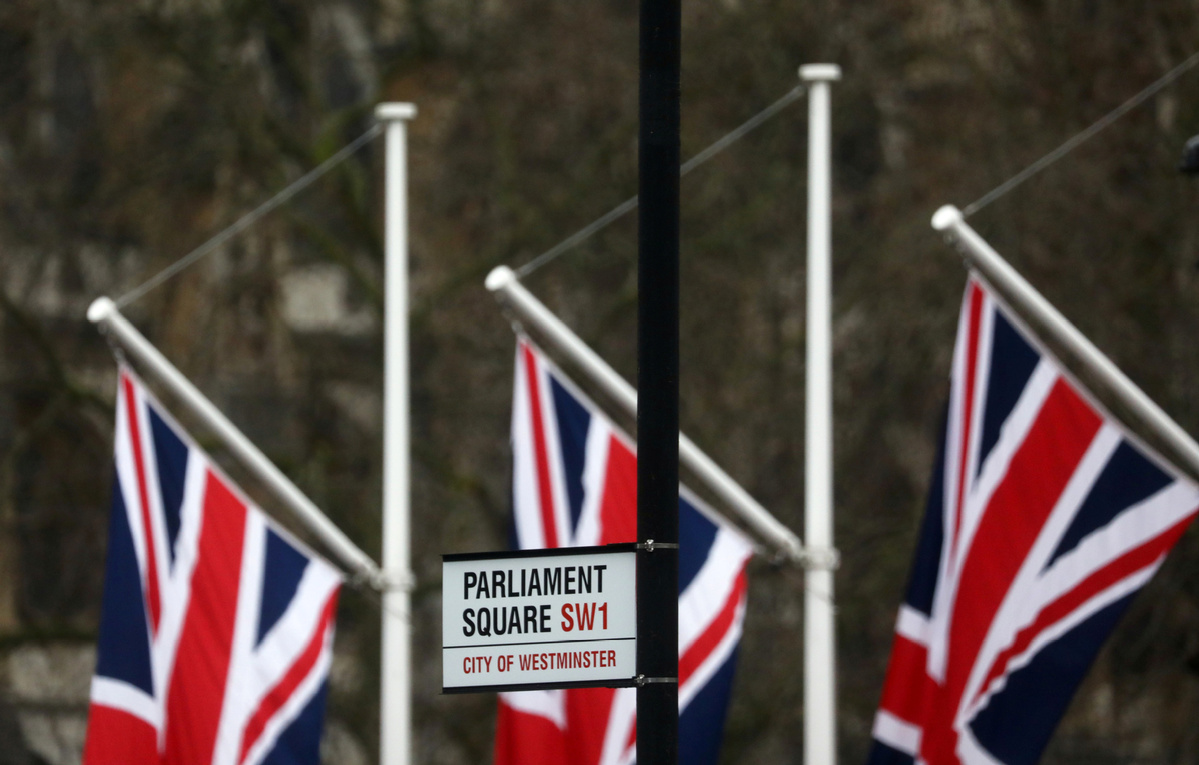
A sign is pictured as British flags flutter at Parliament Square, on Brexit day, in London, Britain January 31, 2020. (File photo: Agencies)
It took a deadly global pandemic to knock Brexit off the front pages in the United Kingdom.
The abrasive debate over the country's future relationship with the European Union dominated the national discourse from the moment a majority voted in mid-2016 to quit the bloc.
But Prime Minister Boris Johnson barely had time to celebrate his election victory last December on a promise to "Get Brexit Done "before COVID-19 struck.
Now, with the UK reeling from the second-highest death toll in the pandemic, Brexit has resurfaced as the clock runs down to its final break with Europe at the end of the year.
Nothing much changed when the UK formally left the EU at the end of January 2020. However, a new trade agreement with the EU has to be worked out during a transitional period that runs out at the end of 2020. If current online talks fail, the UK will leave without a deal.
In separate negotiations, the Johnson government is also trying to secure a quick and favorable trade deal with the United States, to compensate for a possible no-deal with Europe.
However, with the London-Brussels talks bogged down in disagreement just months ahead of the deadline, the Johnson government is reported to be facing a "them or us" ultimatum from US President Donald Trump, who wants the UK to reduce its ties with China as the price for a trade deal with the US.
The pro-Brexit and broadly pro-Johnson Daily Express reported this week that "with UK-US trade talks about to enter their third week, a well-placed White House source has said that China is now a leading issue".
The anti-Brexit, left-of-center Guardian, meanwhile, reported: "The US is seeking to insert a clause that would allow it to retreat from parts of the deal if Britain reaches a trade agreement with another country that the US did not approve."
The newspaper said the proposed clause did not specifically mention China but was regarded by British diplomats in Washington as a lever to deter closer UK-China relations.
The US pressure puts the UK government in a quandary. Successive Conservative Party governments have established good relations with Beijing, particularly on the economic front, since former prime minister David Cameron heralded the start of a "golden era" of the China-UK relationship in 2015.
At the same time, it has sought to navigate the challenges of the "America First" policy that Trump has imposed in the US, traditionally the UK's closest ally. The UK has, so far, resisted pressure to cut China's Huawei out of its 5G plans, and has not been tempted by the Trump conspiracy theories that blame China for the novel coronavirus.
Despite failings in the UK's COVID-19 response-the obsession with getting Brexit done may have blinded ministers to the looming health crisis-the Johnson government has chamioned the need for a multilateral response to the pandemic.
Former Labour Party cabinet minister Ed Balls, hardly a Johnson fan, wrote that UK officials saw the UK's forthcoming presidency of the G7 group of advanced economies "as an opportunity to champion a new multilateralism in economic, trade and health policy in the wake of the global pandemic".
By contrast, he wrote in the UK's Financial Times, the Trump administration had halted funding from the World Health Organization, failed to attend a UK co-chaired vaccine conference, and had doubled down on its hostile anti-China, anti-global governance view of the world.
"Mr Trump will be searching for allies in the coming weeks and will look to Britain for support," Balls concluded.
The differences between Washington and London were apparent, before the COVID-19 crisis hit Europe, during a visit to London by US Secretary of State Mike Pompeo in late January.
While Pompeo talked up the prospects of a US trade deal with the UK, British officials rebuffed his pressure to ban Huawei.
But can the Johnson government afford to continue to act tough, given the looming deadline with the EU?
Brexit ultras in the Conservative Party would positively welcome a no-deal outcome with Brussels but that prospect is making voters increasingly nervous as they confront a separate crisis.
At a time when the UK and other countries are facing a post-pandemic recession, recent polls indicate that at least a narrow majority think a no-deal Brexit would be a bad idea.
For the time being, the Johnson government is adamant that it will not seek an extension from the EU if no new trade deal is in sight by the end of the year.
In those circumstances, the last thing it needs is to be forced to choose between its relationships with Washington and Beijing. London, or at least some UK officials, might be hoping that the outcome of the US election in November will resolve the dilemma for them at the last minute.


